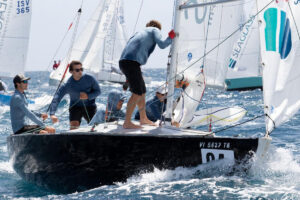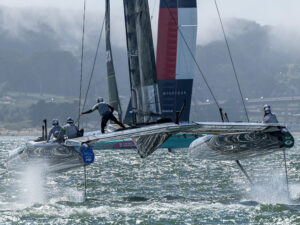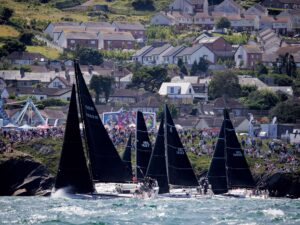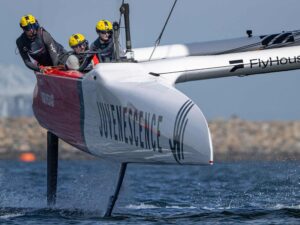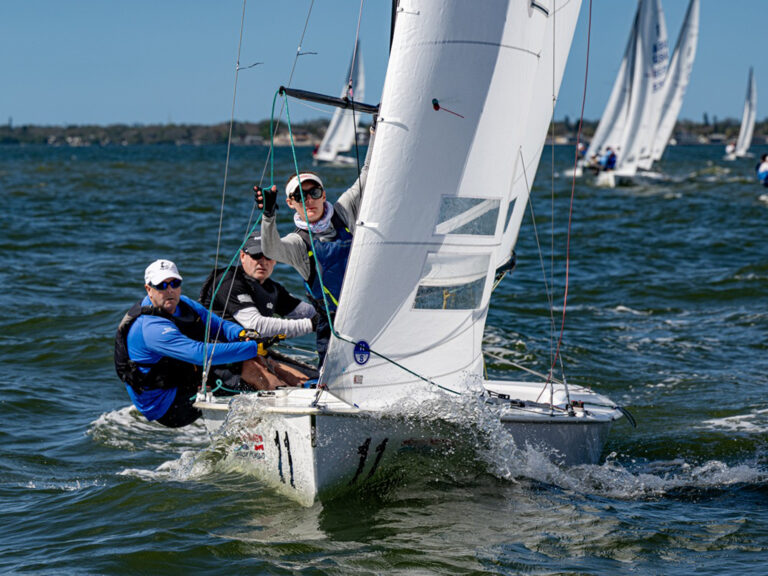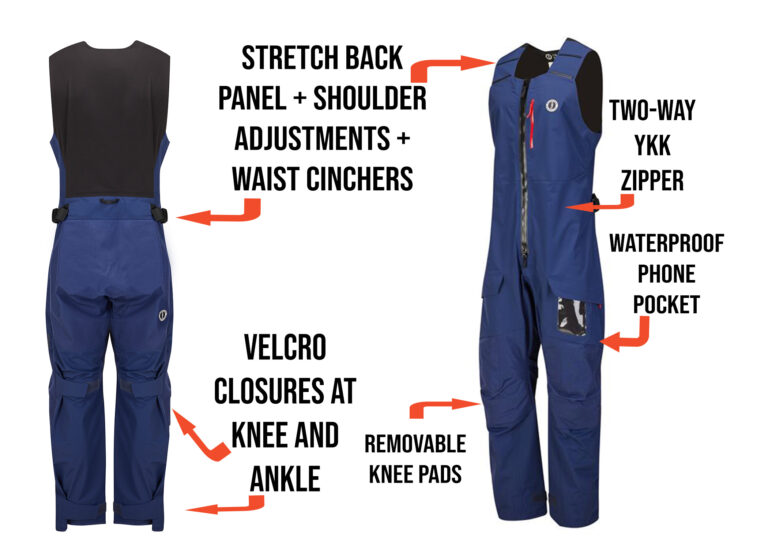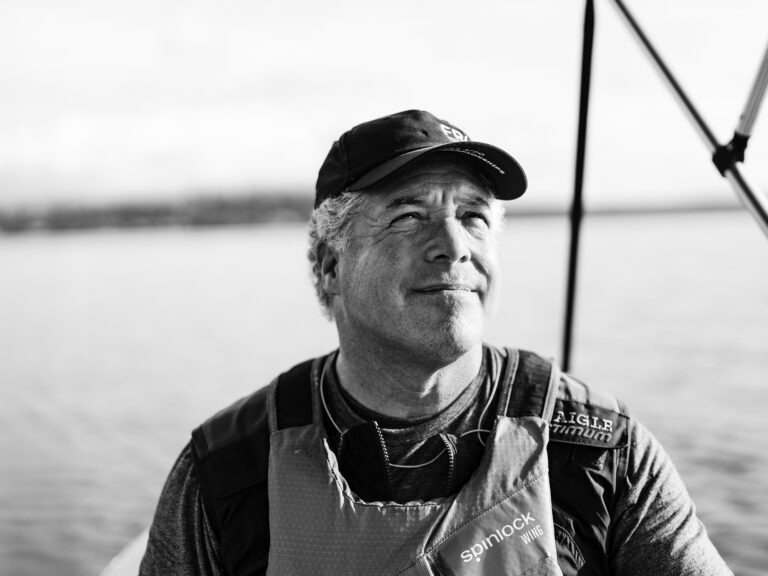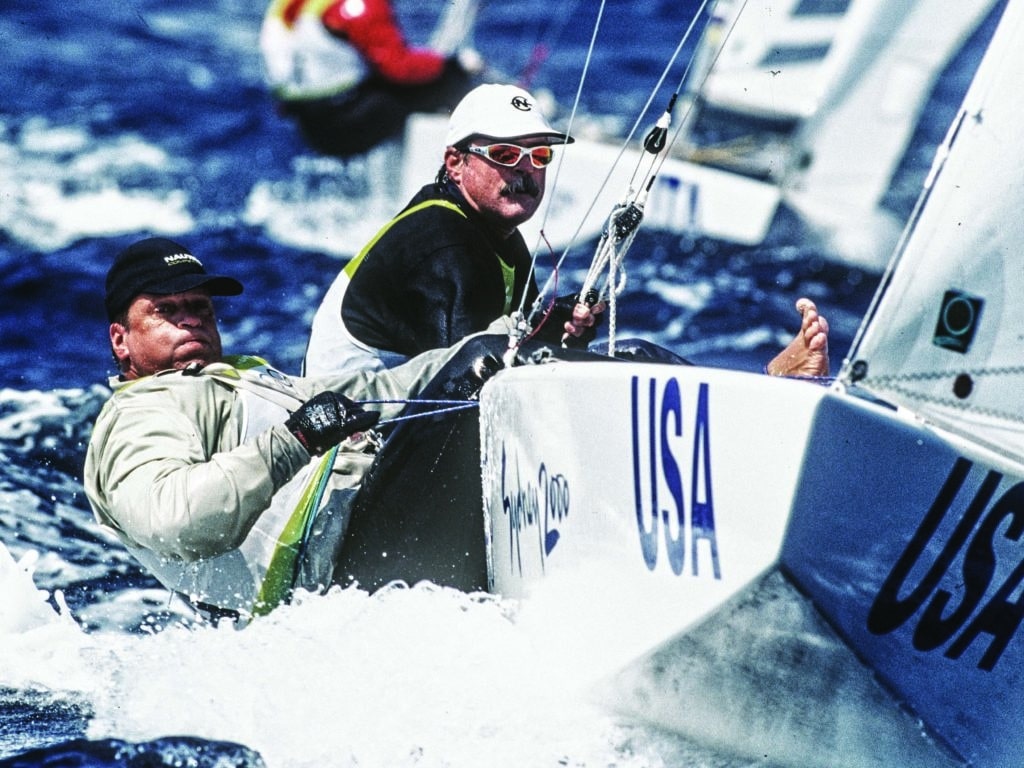
In Olympic sailing, there’s a pretty good case history of favorites not performing well, and at the 2000 Olympics in Sydney, my crew Magnus Liljedahl and I almost joined those ranks. We went into the Games as the anointed ones in the Star class, at least according to Sports Illustrated. We had won the Star World Championship a few months before the Games, so we were the logical choice.
Growing up around Dennis Conner and working for him, I considered “no excuse to lose” part of the path to winning. I think this approach was one reason I never felt too much pressure on the course — that, and my ability to keep calm, never getting too excited or too down. However, there was still a lot at stake for me in Sydney. I’d won a gold medal in 1992 in Barcelona, but there had been missed opportunities as well, some under my control and some not. There was President Carter’s decision to boycott the 1980 Games in the USSR. We were the leading team, but like many, we didn’t sail the trials because of the boycott. Then, when I got my next chance eight years later, in Seoul, a broken mast netted us silver. And the last time I’d been in the Olympics, in 1996 in Atlanta, I’d finished eighth.
That wasn’t the way I wanted the story to end, so I entered the 2000 Games with intensity, but true to my Southern California upbringing, I did so in a laid-back manner. I had the drive to win; I just didn’t wear it on my sleeve.
Magnus was from Sweden — about as far away from Southern California as you can get, and not just geographically. When I first met him in 1979, he had finished second in the Finn Olympic trials, one place away from going to the Olympics. Even thought that was years before our Sydney campaign, I’m sure being that close drove him even harder to make the team this time around. He was well prepared for this competition, as we both were, but his intensity was palpable.
I recall him being taken aback by the fast-food restaurants at the Olympic Village. He pointed at them and told me, “Those shouldn’t be here.” He ate only the right foods, paying close attention to calorie count, protein levels and so on. He went to bed at 8:30 every night and rose at 6 a.m. to work out. In a way, he was ahead of his time, because routines and close attention to nutrition are standard for Olympic-level sailors today. Back then, that approach was the exception. On the water, when we did well, he pumped his fists in the air with excitement and enthusiasm, and when we didn’t, he used the setback to drive himself even harder. Early in my junior sailing days, I went through a period where I would get emotional about wins and losses, but over time I became almost stoic, so at least outwardly, Magnus and I presented quite a contrast.
My success often came from consistency — not trying to win every race, but rather having good races and trying not to have bad ones. Sometimes I didn’t win, but I was always near the top, and when the opportunity was there, I took advantage of it and would win. I’ve learned to let other sailors make mistakes and to only get aggressive at the end of a regatta, if necessary. In Barcelona we were consistently at the top of the fleet right from the beginning, leading from start to finish. In fact, we didn’t have to sail the last race. That’s rare, but it happens.
Sydney was a different story. On the first day, my tactics were way too aggressive. I was trying too hard to make big gains. In the first race, halfway up the first beat, we were the farthest boat to the right. I was confident it was the place to be, and the Australians were with us — always a good sign. But the wind went left, and at the first mark, we were at the back of the fleet. To add insult to injury, we always carried two whisker poles, and whether it was Olympic jitters or not, we managed to drop both of them overboard and ended up crossing the finish line with the jib held out by hand. Between the whisker pole debacle and my tactical blunder, we found ourselves starting the Olympics in 14th. We finished the final race of that day with a third. That helped somewhat, but we knew that first race would be tough to overcome.
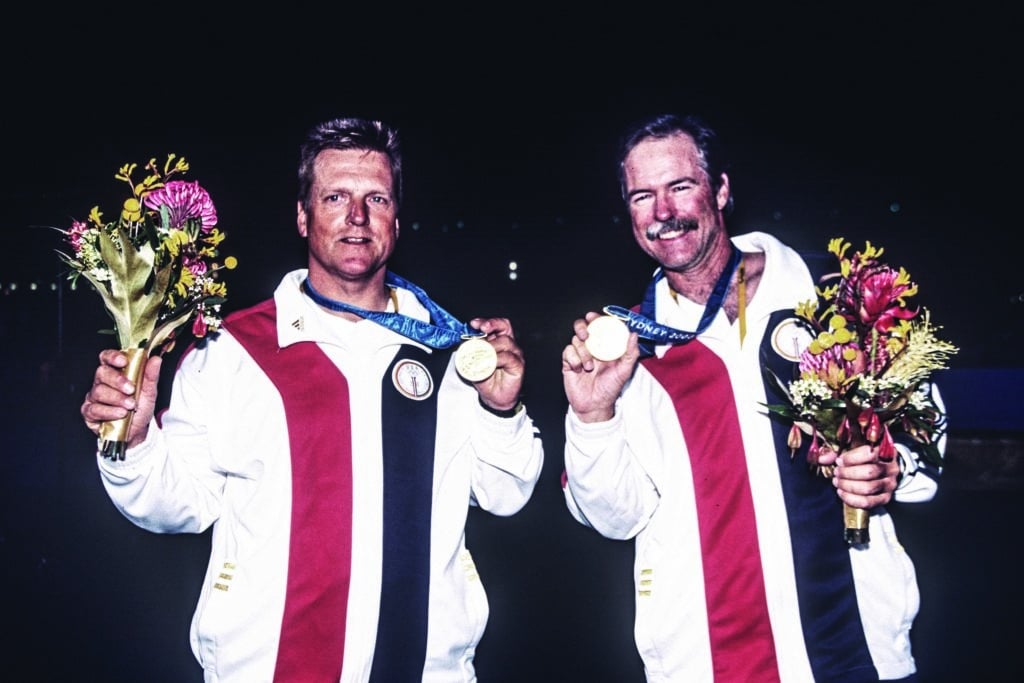
It was obvious to our coach, Ed Adams, that we were both trying way too hard. He sat down with me and stressed the importance of returning to the way I’d always sailed — conservatively. That approach had brought me to the Olympics, and if I wanted to do well, that’s what would do it. He reinforced the idea that I had to fight for each place, even if it meant not finishing in the top few positions; I didn’t have to win every race. We continued to struggle for the next two days, and halfway through the regatta, we were sitting eighth overall. Ed also spent time with Magnus, but took a different tack with him. He took Magnus to the Cruising Club and treated him to a burger and a beer, which was a radical departure from his training regimen. Magnus even stayed up a bit later than normal, and I understood that he stopped off for at least one other beer — maybe more — on his way home. The next day, it was clear he was starting to relax. As for me, I was ready to return to the way I had always sailed. We won the only race sailed that day.
Halfway through the regatta, we were only in eighth place. Anybody watching would have looked at us and said, “Those guys don’t have a chance of medaling.” But we felt otherwise. Each day on the way in, we’d see the Sydney Opera House, which was visible from just about anywhere on the water, and it seemed to speak to us, reminding us of the cliché “It’s not over until the fat lady sings.” And at that point, we were convinced she wasn’t even onstage yet.
As the regatta went on, we became more relaxed and went out to race as we’d done so many times before over the previous four years. On Day 5, we were second, fourth and first, while our competitors began to make mistakes, increasing their points, and suddenly we found ourselves set up for the final day with a guaranteed medal; we were tied with the Brits and five points behind Brazil. The only question was who would get which medal.
We were sailing in the ocean just off the Sydney Heads, and there had been a fair amount of current the previous two days, which was keeping the fleet off the line. The wind was moderate, and everyone was more aggressive. With about 20 seconds to go, we realized we were going to be over-early. We were near the pin, so we decided to just go ahead, cross the line, and loop around the pin. We had one boat, Brazil, below us. We were barely able to cross their bow as the gun sounded. We looped around the pin and started on port. We saw that the X flag didn’t drop, indicating someone else hadn’t returned.
We had catching up to do. Our speed was good, but things got even better as we got headed while sailing off on port tack. When we thought we had gained enough, we tacked and could see we had almost the entire fleet below us, with only Canada, who had led us to the right, ahead of us. The left had been better the day before, but this time the right paid off, and we rounded the first mark in second, behind Canada. Of course, we were paying close attention to the positions of the Brits and Brazilians. The Brits were just a few places back, and we only had to beat them to break the tie. The Brazilians were in about eighth, and even though we had at least the five points we needed on them, we still wanted a buffer between the two of us, in case someone in between us was over-early. It was hard to count exactly, but we appeared to have what we needed. However, we knew that a lot could change during the rest of the race. In this regatta, there was no provision for notifying boats that were over-early; you’d find out after the finish.
Up the second beat, the Brits moved into third, but we had a bit of a lead on them. We considered how aggressive we should be in order to catch Canada. It would be nice to have that extra point in case we needed it to beat Brazil, but it would also most likely mean not covering the Brits, and we couldn’t afford to lose them. We had the points we needed on Brazil, so we covered the Brits. We crossed the finish line second. The Brits were third, and we started counting the boats between the Brazilians and us. It looked like we had the points needed. The wild card would be who was over-early and whether they were in between Brazil and us.
Ed couldn’t come up to us until every boat had finished, but when he approached, my first question was “Who was over?” Ed answered, “Brazil.” We breathed a sigh of relief. It turned out that as we’d sailed over Brazil at the start, they’d broken the line. It was lucky we hadn’t risked trying to catch Canada and possibly losing the Brits.
It appeared we had the gold, but there was one more hurdle. The Star class has a weight rule, so we had to weigh in after coming ashore. The tow in was painfully slow. We had learned that Ed always had a reason for everything; we just weren’t always able to figure it out. Sometimes we were towed a longer distance if Ed knew it would be quicker because of the current, wind or waves. This time we figured he must just be running low on fuel. As it turned out, however, Ed knew we’d be weighed as soon as we came ashore, so he kept us sweating in our foul-weather gear to make sure there was no question we’d make weight, even though we’d been very careful to weigh in every morning. We didn’t have a problem. In fact, Magnus said he’d be willing to cut off a body part if necessary.
That night on the steps of the Sydney Opera House, we received our gold medals as the American anthem played and the Stars and Stripes were raised. As I said, I’ve always been able to stay very composed, but not in that moment.

